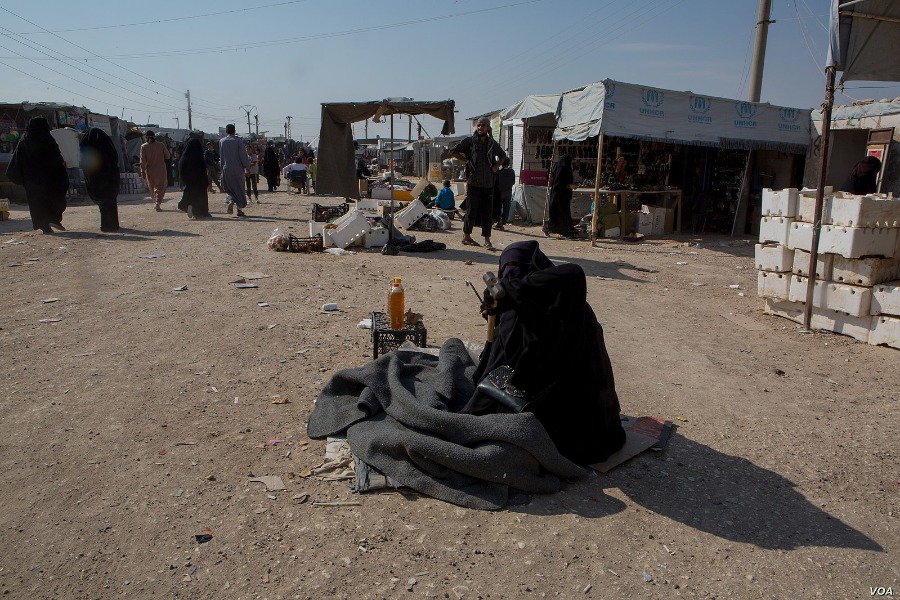Models for Transitional Justice in Syria
Syria can learn from other nations’ successes and failures as it seeks to build a legitimate post-Assad political order.

Published by The Lawfare Institute
in Cooperation With

How can Syrians grapple with the past even as they look forward to a more hopeful post-Assad future? Transitional justice—defined by the UN High Commissioner for Human Rights as “the full range of processes and mechanisms associated with a society’s attempt to come to terms with a legacy of large-scale past conflict, repression, violations and abuses, in order to ensure accountability, serve justice, and achieve reconciliation”—could help advance Syria’s transition from dictatorship, establishing a legitimate new order characterized by the rule of law.
Transitional justice (TJ) can be critical to building a peaceful, prosperous state out of the rubble of an authoritarian collapse. If previously marginalized or victimized individuals and communities do not feel adequately recognized and understood, they will continue to harbor ill-will toward their former abusers, undermining a post-authoritarian transition. On the flip side, those newly arriving in positions of power must be careful not to go too far in alienating individuals affiliated with the old regime lest it foment resentment and hostility. In short, TJ is a critical aspect of building the trust essential to a democratic transition, but it must be pursued carefully.
Transitional justice faces major obstacles in the Syrian context, starting with the scale of violations committed under the Assad regimes. The systematic abuses perpetrated by Hafez al-Assad (1971-2000) and his son and successor Bashar (2000-2024) are spread over half a century. Since the uprising against Bashar first broke out in 2011, Syrians have also been the victims of abuses at the hands of numerous extra-state armed groups such as the Islamic State in Syria and the Levant. In addition to the need to investigate, make public, and potentially prosecute multiple layers of abuse spread over two generations, would-be crafters of TJ mechanisms in Syria must grapple with how to promote reconciliation in a deeply divided society. Moreover, while the state often plays a key role in formulating and implementing TJ measures, the Syrian state is likely to be weak for the foreseeable future and unable to lead TJ efforts effectively.
However, Syrians can look to examples from the Middle East and North Africa to draw lessons from previous transitional justice efforts—both their successes and failures. These cases demonstrate the importance of acting early to seek justice rather than revenge, ensuring vetting processes do not become overly exclusionary, and focusing on victims (including missing persons) and their families throughout the transition process. TJ processes are only one of many—often competing—imperatives of a post-authoritarian transition, and attempts to face the past can also generate instability in the short term.
Transitional justice is essential to a successful transition and legitimate governance in the long term. But it is far from the only imperative of a transition such as Syria’s. TJ can work only if it is pursued alongside measures such as security sector reform, decentralization, and the empowering of civil society.
Iraq: Early Mistakes and Later Successes
Post-Saddam Hussein Iraq offers lessons about how early decisions in conducting TJ can undermine democratic institution-building, as well as more promising examples for addressing past abuses. Vetting processes, which screen individuals to determine if prior conduct—engaging in human rights abuses or corruption, for instance—warrants their exclusion from public office, are one aspect of TJ that became particularly damaging for Iraq’s transition. Vetting focuses mainly on those institutions that played a role in human rights violations, such as the security and judicial sectors. Vetting often removes individuals deemed to be problematic from certain positions or restricts them from seeking such positions. This must be distinguished from a purge, which implies wholesale exclusion of individuals or categories of persons based on their mere association with the former regime.
In Iraq, the harsh vetting-turned-purge policy popularly known as “de-Baathification” (al’ijtithaath hizb al’ba’ath) originated with the U.S. occupation authority and its order to dissolve the Iraqi army and ban many former Iraqi officials from participation in post-2003 institutions. The Shiite parties that governed Iraq after the handover of sovereignty in 2004 intensified and politicized de-Baathification, marginalizing parts of the population—especially Sunnis—and fueling a growing insurgency. Poorly conceived, badly implemented, and controlled by hard-liners, the vetting process was highly politicized, thereby eroding the rule of law and intensifying sectarian tensions.
The approach to criminal accountability in the post-Saddam Iraqi state was similarly problematic. The trials of Saddam Hussein and seven of his top lieutenants in the Iraqi Special Tribunal were also highly politicized and focused on a narrow range of charges. As such, they failed to promote truth-telling or reconciliation and in fact further served to alienate Sunni Iraqis from the post-Saddam political order, helping to set the stage for years of sectarian strife and instability.
Iraq’s initial approach to TJ provides an endless reservoir of lessons about the dangers of purges and retributive justice. However, more recent Iraqi attempts at TJ—which have focused on Islamic State violations—set a more hopeful precedent for Syria. The Iraqi government, along with multiple other countries and UN investigations, have recognized Islamic State atrocities against the Yazidi community as genocide. In addition, in October 2020, the Iraqi federal government and the Kurdish Regional Government signed the Sinjar Agreement to stabilize and reconstruct the historic Yazidi homeland and rehabilitate its population. In March 2021, the Iraqi parliament adopted the Law on Yazidi Women Survivors, which provides recognition and compensation to Yazidi women survivors, as well as women from the Christian, Turkoman, and Shabak minorities. While these measures have done little in terms of providing criminal accountability for Islamic State crimes, they are victim-centric, acknowledging the scale of the violations and providing compensation to victims and their families, integrating them into the transition process.
Other Iraqi TJ initiatives have been adopted in the wake of Islamic State atrocities. In January 2016, the Iraqi state created a High Presidential Committee for National Reconciliation. Starting in 2017, the government organized reconciliation conferences, established local dialogue and reconciliation commissions, and sponsored the return of internally displaced persons to their original homes. Some of these activities were funded by foreign governments, international organizations, and nongovernmental organizations.
More recent Iraqi efforts focused on missing persons can serve as positive models for Syria as well. Like Syria, Iraq’s blood-soaked history has produced hundreds of thousands of missing persons (mafqoodeen)—by some estimates, more missing people than any other country. But Syria is not far behind. UN estimates indicate that more than 130,000 persons are missing as a result of the civil war in Syria, with untold others missing and disappeared from before the conflict.
Accounting for the fate of missing persons and providing compensation are critical modes of TJ. Iraq has taken meaningful steps in this regard. The Iraqi health ministry and the Martyrs Foundation work to identify victims and compensate their surviving relatives. Supported by international experts, the government sends teams of forensic anthropologists and doctors to find and excavate mass graves and identify bodies. Recent efforts have focused on mass graves dug by the Islamic State, but there are many other sites throughout the country.
Tunisia: Early Successes Followed by Disappointments
Early decisions about TJ in Tunisia offer a contrasting model to that of Iraq. In the Tunisian case, initial efforts to democratize were ultimately undermined as politicians’ focus on identity conflicts led them to neglect issues such as regional socioeconomic disparities and a mounting debt crisis. In the months after former dictator Zine al-Abidine Ben Ali’s flight, interim decision-makers debated whom to include or exclude from the former ruling party in the first post-dictatorship elections for a constituent assembly. Those in favor of excluding party members from the entire 23 years of Ben Ali’s rule argued that all members had been complicit in injustices. Yet others argued that such sweeping measures would exclude too great a segment of the population from what were meant to be nationally representative elections. They instead suggested that only key party members from the last ten years of the regime—arguably, when corruption was at its peak— should be excluded.
The final interim electoral law struck a compromise, defining the criteria for eligibility based not on a defined time period but rather on an individual’s role within the party and on whether or not they had supported another reelection bid for Ben Ali. The Tunisian case demonstrates the inherent tension of excluding those involved in past crimes without depriving the new state of the required competence and knowledge that old regime members can bring. It also helped set the tone for subsequent TJ mechanisms, including the rejection of legislation for political exclusion in 2014.
Early decisions in Tunisia also established the need for fact-finding commissions to investigate both financial crimes and human rights abuses committed under the old regime. This ultimately led to the creation of a Truth and Dignity Commission (TDC), which spent more than four years hearing testimony from collective and individual victims in order to ensure Tunisians would never again become subject to such abuse.
Despite the attempts at inclusion and reconciliation in Tunisia, TJ there quickly became politicized—a trend exacerbated by regional economic inequality and a mounting debt crisis. Throughout its existence, the TDC was subject to harsh criticism, and the elected government largely ignored the recommendations of its final report. Additionally, the appointment and tenure of the commission’s head, Sihem Bensedrine, was highly controversial. In 2024, Bensedrine was arrested for allegedly accepting a bribe to falsify the final report—another apparent political move by strongman Kais Saied, who asserts that only through his sweeping authoritarian measures can Tunisia’s revolution be restored. This collapse of TJ in Tunisia is reflective of a larger breakdown in democratization there due to—among other factors—a lack of economic improvements.
Libya: TJ plagued by retribution and an absence of trust
Nonetheless, these early decisions in Tunisia’s attempted political transition helped set the stage for more transparent and inclusive TJ processes, rather than measures based on a desire for retribution. In contrast, early decision-makers in Libya moved in the opposite direction by giving outsize influence to “revolutionaries,” or individuals who had taken up arms against the old regime during the approximately eight-month war that ultimately ousted Col. Moammar Gadhafi. Libya’s transitional rulers registered the revolutionaries as part of the new state security apparatus and granted them a host of privileges. This decision set a tone of a transition that favored certain armed actors while excluding others (including in communities such as the southern town of Bani Walid, thought to be affiliated with the Gadhafi regime). Empowered by the transitional authorities and bolstered by a narrative of revolutionary legitimacy, the militias soon began to push for harsher forms of retributive justice. In 2013, interim parliamentarians adopted a sweeping—in some ways, even more sweeping than de-Baathification in Iraq—political isolation law (qanun al-azil asiyasi) listing more than 20 criteria for exclusion of individuals affiliated with the former regime. The divisions created by the law helped precipitate fragmentation and civil war, while the deputization of the armed groups as security providers further contributed to an atmosphere of instability and impunity.
In addition, a glaring lack of trust among Libya’s disparate groups has continued to undermine TJ processes. Since Libya’s division into competing governments more than a decade ago, various authorities have continued to struggle for control over TJ mechanisms. A 2015 internationally brokered political agreement—which has been largely ineffective—created a presidential council meant to represent Libya’s three regions, and the 2020 Libya Political Dialogue Forum charged the council with leading national reconciliation. But the eastern-based parliament has advanced competing national reconciliation projects. This tussle over ownership of the process guarantees that it will be difficult to satisfy Libyans’ desire to come to terms with the past and move forward.
***
Although TJ is critical for ensuring a peaceful and sustainable transition from authoritarian rule, the experiences of Tunisia, Libya, and Iraq show how interim decision-makers face a host of challenges in establishing such processes. Above all, Syrians will need to establish independent mechanisms for documenting abuses, both those occurring in the distant past and those that took place as part of the revolutionary struggle. Victims of human rights abuses want to know the truth. Additionally, the experiences of other countries in the region show that TJ is inextricably intertwined with other transitional processes. In other words, it is inherently political and must be buttressed by broader aspects of transition such as judicial, security sector, and economic reforms, as well as the involvement of civil society and local governments. The political isolation law in Libya resulted from revolutionary politics that gave too much power to unaccountable armed groups. In Iraq, a weak judiciary and rampant corruption undermined any attempts to pursue justice and accountability. And in Tunisia, failure to address economic concerns helped undermine stability and political progress—including efforts at TJ.
Interim Syrian leaders have so far indicated that they will not pursue purges against rank-and-file figures associated with the Assad regime based on affiliation alone. Yet the temptations of retribution will not easily dissipate. Moreover, as was the case in Iraq and Tunisia, groups jockeying for power in the post-Assad system are likely to try and use TJ processes as a way to block their political rivals. Weak economic conditions and persistent social tensions in Syria also make TJ appear daunting.

-boduszyński.png?sfvrsn=133429b3_3)




